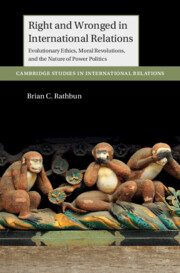 Right and Wronged in International Relations
Right and Wronged in International Relations Book contents
- Right and Wronged in International Relations
- Reviews
- Cambridge Studies in International Relations: 163
- Right and Wronged in International Relations
- Copyright page
- Dedication
- Contents
- Figures
- Tables
- Acknowledgments
- 1 The Nature in and Nature of International Relations
- 2 Lesser Angels
- 3 Mankind Is What Anarchy Makes of It
- 4 See No Evil, Speak No Evil?
- 5 To Provide and to Protect
- 6 Just Desserts in the Desert
- 7 Barking Dogs and Beating Drums
- 8 Biting the Bullet
- 9 Dying in Vain
- 10 Daily Bread
- 11 From Demonizing to Dehumanizing
- Index
- Cambridge Studies in International Relations: 163
11 - From Demonizing to Dehumanizing
War under Hitler and the Implications for Humankind
Published online by Cambridge University Press: 29 July 2023
- Right and Wronged in International Relations
- Reviews
- Cambridge Studies in International Relations: 163
- Right and Wronged in International Relations
- Copyright page
- Dedication
- Contents
- Figures
- Tables
- Acknowledgments
- 1 The Nature in and Nature of International Relations
- 2 Lesser Angels
- 3 Mankind Is What Anarchy Makes of It
- 4 See No Evil, Speak No Evil?
- 5 To Provide and to Protect
- 6 Just Desserts in the Desert
- 7 Barking Dogs and Beating Drums
- 8 Biting the Bullet
- 9 Dying in Vain
- 10 Daily Bread
- 11 From Demonizing to Dehumanizing
- Index
- Cambridge Studies in International Relations: 163
Summary
A comparison of the behavior of the German army in World War I and World War II in occupied Eastern Europe shows the human cost of the difference between Wilhelmine and Nazi nationalism. Hitler aimed not at the paternalistic civilizing of conquered peoples but rather the elimination, evacuation, and instrumentalization of non-Aryan populations. Yet the fact that Hitler is the exemplar of this kind of instrumental violence indicates the rarity of behavior thought to be so common in international relations models. This has great normative implications. As much as moral philosophy seeks to maintain a separation between the way the world is and the way that it should be, all normative arguments rest on (even if only implicitly) empirical claims about what is possible. We know by the empirical rarity of those who think like Hitler that he was mistaken about the amoral nature of man, and therefore that normative theorizing still has a place. Once we understood where Hitler’s crude struggle-based biological determinism went wrong, by failing to recognize what is uniquely about humans among other animals – their morality – biology buttresses rather than undermines liberal ethics. Morality is more than a social construction.
- Type
- Chapter
- Information
- Right and Wronged in International RelationsEvolutionary Ethics, Moral Revolutions, and the Nature of Power Politics, pp. 336 - 367Publisher: Cambridge University PressPrint publication year: 2023
